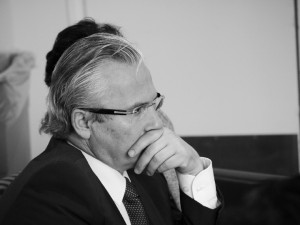Caught in the crossfire: Collateral damage in the Garzón case
(Editor’s note: This text was published in Spanish by El País on February 17.)
I have just read the writ with which the presiding judge dismisses, on the grounds of an expired statute of limitations, the so-called “New York” case against Baltasar Garzón. In this writ of dismissal, as well as in his previous writ of indictment, the judge claims that New York University has concealed or fudged information during the course of the investigation. As the epitome of this claim, the judge once again cites the fact that, when asked for a report on Garzón’s NYU earnings in 2005 and 2006, the university originally reported one set of figures, and then later sent a rectification with lower figures.
I was Director of NYU’s King Juan Carlos I of Spain Center from 1995 – 2007, and so I have first-hand knowledge of this particular issue and many other issues related to this case. The reading of this latest writ conjures up memories of the stressfulness of these last few years, when, through ignorance, misunderstanding and/or malice, my own good name, and the good names of my colleagues at the King Juan Carlos I of Spain Center and at New York University have been sullied in the media, in the documents and communiqués of the accusers in this case, and, most gravely, in the writs of Spain’s Supreme Court.
Seen with some distance, I can now appreciate that many of these misunderstandings stem from the fact that the judge (and his predecessors in this investigation) chose not to follow the established international protocol for a Spanish court to gather testimony and information from people or institutions with residence in the United States. For example, when the Tribunal Supremo sent to the address of an NYU academic program in Madrid a summons compelling me to testify in the case, I was advised by legal counsel in New York to explain to the court that I am a citizen of the US and a resident of New York, and to wait for the Spanish court to file its request through the proper international legal channels. That is what I did. In response, the judge ordered what turned out to be a highly publicized police investigation to determine if in fact I was a resident of Spain; of course the finding was that I am not. But some people in Spain saw in my respect for international judicial protocol a lack of respect towards the Spanish legal system or worse, an attempt to conceal information. Nothing could be further from the truth. The truth is, I never received a summons to testify routed through the proper bilateral channels, and as a result, many things in the trial went unclarified. Due to a lack of information, innocent acts were wrongly ascribed to bad motives.
An excellent example is the case I mentioned at the start, when the Spanish court demanded from NYU, a private university in the United States, documentation of the wages earned at NYU by Judge Garzón in 2005–2006. The first response I received from lawyers in New York was that such information could never be released without an order from a US court, or permission from the individual in question. Garzón immediately gave his permission, and NYU sent the requested information. Weeks later, I realized, to my profound dismay, that an NYU employee, while compiling the information, had misread Garzón’s W-2 form (Wage and Tax Statement) for 2005 and 2006, and had in fact ADDED to the figure of “wages” the adjacent figure of “federal tax withheld.” So, in our original report to the tribunal, what in fact had been WITHHELD from Garzón’s income had mistakenly been ADDED to his income. Of course we immediately sent a rectification to the tribunal. Now, perplexed and angered, I see that, in what might well be the last word in this case, the judge once again cites the conscientious correction of an inadvertent and unfortunate error as the epitome of NYU’s alleged bad faith.
An old African proverb says: “When the elephants fight, the grass gets trampled.” Caught in the crossfire of a personal, political and professional battle against Judge Garzón, New York University and its King Juan Carlos I of Spain Center have become just one more blade of trampled grass. All around us, in the wake of this merciless campaign, there is a devastated landscape; and there have been no winners, and we have all lost a great deal.
James D. Fernández is Professor of Spanish Literature and Culture at New York University














Professor, When did any court or enquistion in spain result in a fair trail?
Michael Munoz